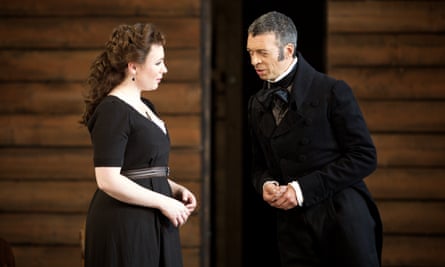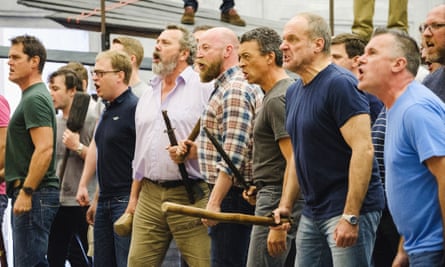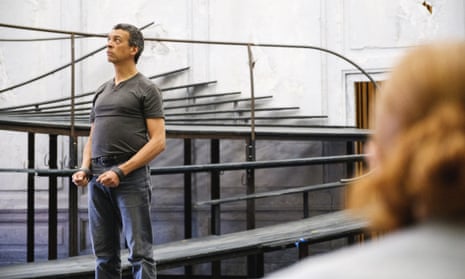“Much good has been shown me, and much evil, and the good has never been perfect …”
So says Captain Edward Fairfax Vere at the opening of Britten’s opera Billy Budd – based on Herman Melville’s novella – set aboard the British navy ship HMS Indomitable during the wars with the French republic at the end of the 18th century. Thereby he sets in motion a drama which, although played out on the large canvas of grand opera, essentially boils down to a psychological and emotional struggle between three characters: the austere and pragmatic Vere, the manipulative, sadistic John Claggart – master-at-arms aboard ship, and thereby responsible for its policing – and the orphan lad Billy Budd, an able seaman and heroic talisman for his shipmates, though possessed of an intermittent, disabling stammer.
We operatic baritones are often awarded the villainous roles in opera as a foil to our gallant tenor colleagues and I, for one, relish my chances to play the bad guy. Don Giovanni, Nick Shadow, Tarquinius, Baron Scarpia; these are just some of the characters I have portrayed who have allowed me to explore the darker reaches of human nature in the safety of the rehearsal room playground. I have enjoyed every minute of it.
Perhaps I have grown used to inhabiting such people in operatic form, but it strikes me that it has been relatively easy to flesh out these monsters of men. Could it be that we are all aware, even while seeking to control our inner demons in our daily interactions with people we meet (in other words, taking our place in polite society), that our internal monologue running just beneath the surface could be released with startling ease – and, one thinks mischievously, with hilarious results? Welcome to the world of opera.
But, as I rehearse for my debut in the role of Billy, how to be good? Or rather, how does one portray an angel without making him, frankly, a bit dull?
The director of our new production at Opera North, Orpha Phelan, began the first week of rehearsals with a cast-bonding exercise. She invited us to a movie-night screening of Peter Ustinov’s 1962 Oscar-winning adaption of the story. Ustinov not only directed and co-wrote the script but also gave a terrific portrayal of Captain Vere. Meanwhile, Billy was played by Terence Stamp in his debut screen role, looking especially youthful and innocent.
Although Stamp was an East End lad, he gave Billy a soft, slow, West Country accent, which may have been intended to imply that Billy, though kind and generous, is not overly intelligent – so much for 1950s regional stereotyping. Billy’s gift instead is a natural, uncanny empathy, drawing out the best qualities in anyone he meets. In a wonderful scene that appears neither in book nor opera, he almost succeeds in drawing Claggart out of his own self-loathing, a feat that would have today’s psychotherapists applauding.
It was interesting to watch the film in the company of my predominantly male colleagues. Many of Billy’s simple, homespun utterances were met with a little derision by our modern-day, cynical audience, and I was reminded how difficult it can be to portray pure goodness. We sophisticates nowadays don’t believe in such nonsense.
One thing is clear to me: one cannot be content to play a cipher. True, the opera is more an exploration of Captain Vere’s psyche and his wrestle with the repercussions of one, momentous wartime decision. In that light, Claggart and Budd can be seen as opposing sides of his own consciousness. But this doesn’t provide me with much on which to base a character.

Interestingly, my previous operatic role was the eponymous antihero of Tchaikovsky’s opera Eugene Onegin. Director Sir Michael Boyd stated from the outset that the typical, shorthand view of Onegin as a villain did not wash with him. Instead, we started with the premise that Onegin could just as easily be a good man, but one who has to make some awkward, unfortunate decisions, often in the heat of the moment, the results of which come to haunt him for the rest of his life. That, we thought, was basis of a truer tragedy than the scenario “bored dilettante unceremoniously dumps girl, shoots friend and then endlessly mopes about it”. How can an audience invest in that?
And so I realise that the truth of Billy Budd is that he is no angel. It may well be that Vere, years after the event, remembers him as such, but for my purposes Billy is alive on stage as a man, fully rounded and equally capable of destruction and conciliation. “Look out for his temper,” warns Claggart to his hapless informant, Squeak. “Look out for those fists. You’re playing with fire, Squeak. He’ll kill you if he catches you!” In the same way that Billy can understand a man to his very core with one glance, so Claggart can fathom Billy. He recognises something in Billy’s chronic stammer, a seizure that hints at some severe past trauma, an incident of such severe violence that Billy’s nervous system would rather close down than allow the memory a physical expression.

This suppression of violence is most interesting. It suggests intriguing clues to a backstory for Billy. What happened to him before he became an able seaman? What prompted him to go to sea in the first place? All we are told about his upbringing (in Britten’s opera) is that he was “… found in a basket tied to a good man’s door, the poor old man”. Who was that man? Did he bring Billy up on his own? How did that work? And why does Billy refer to him as “the poor old man”? Could it be that, as Billy grew tall and strong, he also grew wild? And wouldn’t his substitute father figure have felt the need to discipline him? How would that relationship have played out in the 18th century? With a rod or a belt, surely. When, within moments of arriving aboard the Indomitable, Billy observes the unfortunate Novice return from a flogging, could this have reminded him of scars in his own history?
By this point, I am far into the world of conjecture, I know. However, it is just such conjecture that can help build a full person around a character on the page. It can help give deeper meaning to an odd aside or a throwaway line. It can explain the motivation of an otherwise extraordinary action – something that might appear out of character, there only to further the plot. For instance, I had not previously reconciled the end of the opera, when Billy transcends his own character and blesses Vere as he ascends to his final hanging. Why this benediction, I have wondered?
If Billy has his own debts to pay – debts that centre around a father figure whom he once rejected, maybe even violently – then it could explain the speed with which Billy latches on to Captain Vere aboard ship, and his need to “look after” and “save” him once there. Certainly Vere exorcises his demons during the course of this opera. But I would like to imagine that Billy has a chance to exorcise some of his own as well. He can go to the yardarm knowing that he might atone for his own past crimes and find his own peace: “I’ve sighted a sail in the storm, the far-shining sail that’s not fate. And I’m contented. I’ve seen where she’s bound for. She has a land of her own where she’ll anchor for ever.”
- Opera North’s new production of Billy Budd opens at Leeds Grand theatre on 18 October, then tours until 3 December.

Comments (…)
Sign in or create your Guardian account to join the discussion